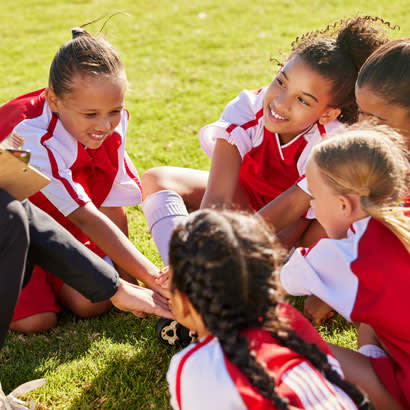
If you are a manager or coach of a youth sports team, you know how important careful program planning is to your team’s operations and success. However, your planning process should go beyond scheduling practices and creating informational materials—it also needs to include team-building activities.
Team building can improve your team’s performance by helping players work together. It also increases team spirit and helps cultivate transferable life skills like leadership and communication, just to name a few benefits.
To help you plan team-building initiatives for your youth sports team, here are three strategies to consider:
- Get the Whole Team Involved in Fundraising
- Plan Team Social Events
- Start a Mentoring Program
With a little creativity and collaboration with staff, volunteers and parents, you’ll be able to make the most of these team-building opportunities. Let’s get started!
1. Get the Whole Team Involved in Fundraising
Fundraising is an essential part of running a youth sports program, as it helps keep registration fees low while providing enough revenue for equipment purchases, travel and more. Getting team members involved in fundraising takes some of the work off of you and your staff and creates a new way for team members to work together off the field or court.
Some effective ideas for youth sports team fundraisers include:
- Online shopping fundraisers. An online shopping fundraiser allows your community to contribute to your team simply by making everyday online purchases. Get started by signing your team up with a shop for a cause platform that will handle retailer negotiations for you. When community members use the platform’s app or browser extension while shopping online, a portion of their sales total will go directly to your team.
- Fundraising letter campaigns. Draft and print a letter explaining your team’s fundraising needs, and include stories and photos to make the message more engaging. Then, get your team together for an envelope-stuffing party!
- Peer-to-peer events. These fundraisers have two parts: a peer-to-peer campaign and an “a-thon” style event where participants do a certain activity for as long as they can. If you choose an event that aligns with your sport, you’ll give team members a chance to practice their skills while they fundraise. For instance, a swim-a-thon works well for a swim team, while a basketball team might hold a free throw shoot-a-thon.
According to ShopRaise’s team fundraising guide, the key to a successful fundraiser is ensuring all members of your sports team are working toward the same goal. Not only does a goal help you measure your team’s fundraising success and create a more accurate team budget, but collaborating off the field also fosters a sense of camaraderie among team members, which can improve their teamwork overall.
2. Plan Team Social Events
In addition to working toward common goals, you can help your sports team build camaraderie by providing opportunities for them to get to know each other outside of practice. Consider hosting fun events for team members each season, such as:
- A dedicated team-building day with icebreakers and team challenges to start the season off on the right foot.
- Team lunches or dinners after games.
- An end-of-season party with snacks, fun activities, and awards for top contributors to the team.
- A volunteer day where team members can give back to their community.
These socialization opportunities can help cultivate friendships among team members that last beyond the sports season, creating a positive sports experience for these young athletes.
3. Start a Mentoring Program
Mentoring programs allow your team members to develop life skills in addition to becoming better at their sport through teamwork. Match up more experienced mentors with one or a small group of mentees with similar interests or abilities (such as the position they play). Provide some guidelines for how the mentoring sessions should go, and make your program a safe space to ask questions and have meaningful conversations.
If your team is part of a league that includes multiple age groups, integrating mentoring into your team structure will be fairly easy, as the older athletes can mentor the younger players. If not, contact athletes who have aged out of your program to see if they’d be interested in continuing their involvement through mentoring.
In addition to the numerous benefits team building provides for athletes, these programs can also boost your youth sports program’s reputation as one that cultivates an all-around good experience. Weigh your options and consult with staff, volunteers and parents to choose the initiatives that will be most effective for your team.
Korri Piper is a sales and marketing consultant and the director of vendor relationships at ShopRaise.

